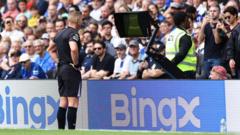Did VAR Just Wrong Fulham and Wolves?

Published: 2025-09-10 12:40:26 | Category: sport
In a recent round of Premier League matches, VAR officials made notable errors that have reignited discussions around the effectiveness of video assistant refereeing in football. Key decisions in the Fulham vs Chelsea and Wolves vs Everton matches highlight the ongoing challenges faced by match officials in utilising technology to support fair play.
Last updated: 30 August 2023 (BST)
Key Takeaways from the VAR Controversy
- Josh King's goal for Fulham was wrongly disallowed after a VAR review.
- Wolves were denied a penalty for a foul that many believe should have been awarded.
- Pundits and managers are increasingly critical of VAR's impact on the game.
- The PGMOL has acknowledged the mistakes and aims for improvement.
- The panel reviewed 35 incidents but found only two errors leading to disallowed goals last season.
Understanding the VAR Decisions
The video assistant referee (VAR) system was designed to assist on-field referees in making accurate decisions. However, during the match between Fulham and Chelsea on 30 August, VAR intervention led to significant controversy. Josh King's goal, which came in the 22nd minute, was disallowed after a lengthy review. The decision was based on a foul committed by Rodrigo Muniz, who was said to have stepped on the foot of Chelsea's Trevoh Chalobah during the build-up.
What Went Wrong with King's Goal?
Howard Webb, the chief refereeing officer for Professional Game Match Officials Limited (PGMOL), categorised the disallowed goal as a "misjudgement." The Key Match Incidents panel, tasked with reviewing major refereeing decisions in the Premier League, expressed unanimous support for the original on-field decision to allow the goal. The intervention by VAR Michael Salisbury was deemed unnecessary and incorrect, reflecting a growing concern about VAR's reliability.
The Aftermath of the Disallowed Goal
Following the disallowed goal, Chelsea managed to secure a 2-0 victory over Fulham, with goals from Joao Pedro and Enzo Fernandez. Manager Marco Silva voiced his frustration, stating, "How you disallow a goal like that is unbelievable," emphasising that VAR should not be used to "re-referee the game." Silva's comments resonate with a broader sentiment among fans and pundits who fear that VAR is undermining the flow and integrity of football.
Wolves vs Everton: Another Controversial Call
In a separate incident during the same matchday, Wolves faced Everton and were denied a penalty for a foul on Hugo Bueno. The panel noted that VAR Craig Pawson's decision not to intervene was a mistake, with three of the five panel members believing that the contact made by Iliman Ndiaye was careless and warranted a penalty. The panel's assessment further highlights the inconsistencies in VAR implementation, raising questions about its effectiveness in enhancing the accuracy of officiating.
Statistical Overview of VAR Errors
Last season, the independent panel indicated that there were 18 VAR errors recorded, with the majority stemming from missed interventions rather than incorrect on-field decisions. Notably, only two VAR errors resulted in disallowed goals. This data underscores the challenges faced by VAR officials in making split-second decisions that can significantly alter the outcomes of matches.
The Response from PGMOL and Future Improvements
The PGMOL has acknowledged the recent errors and is committed to improving the VAR system. Webb's comments regarding the misjudgement in the Fulham vs Chelsea match indicate a willingness to learn from past mistakes. The independent panel, which includes former players and coaches, aims to provide constructive feedback to enhance the decision-making process.
Conclusion: The Future of VAR in Football
The recent controversies surrounding VAR decisions in the Premier League highlight the complexities of integrating technology into football. While the system was introduced to reduce errors and improve fairness, its implementation has been met with criticism from players, managers, and fans alike. As the PGMOL works to refine VAR processes, the future of officiating in football remains a topic of intense discussion. Will VAR evolve to better support the integrity of the game, or will it continue to spark debate?
#VAR #PremierLeague #FootballOfficiating
FAQs
What is VAR in football?
VAR, or Video Assistant Referee, is a technology used in football to assist referees in making more accurate decisions regarding goals, penalties, and red cards by reviewing video footage.
Why was Josh King's goal disallowed against Chelsea?
King's goal was disallowed due to a foul by Rodrigo Muniz on Trevoh Chalobah, as deemed by VAR officials, although the on-field panel later supported the original decision to allow the goal.
What did Howard Webb say about the VAR decisions?
Howard Webb described the decision to disallow King's goal as a "misjudgement," indicating that there was a need for improvements in VAR decision-making processes.
How many VAR errors were reported last season?
Last season, there were 18 VAR errors reported, with most stemming from missed interventions rather than incorrect decisions made on the field.
What impact does VAR have on football matches?
VAR is intended to enhance fairness in football matches by correcting clear errors, but it has also been critiqued for disrupting the flow of the game and causing confusion among players and fans.



